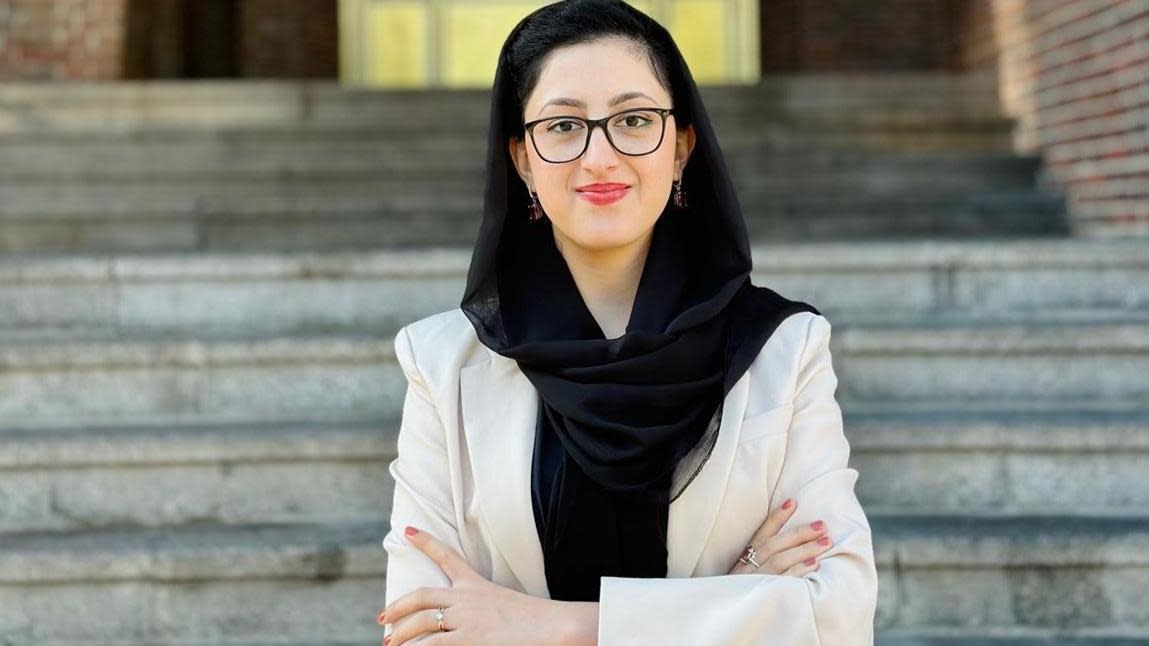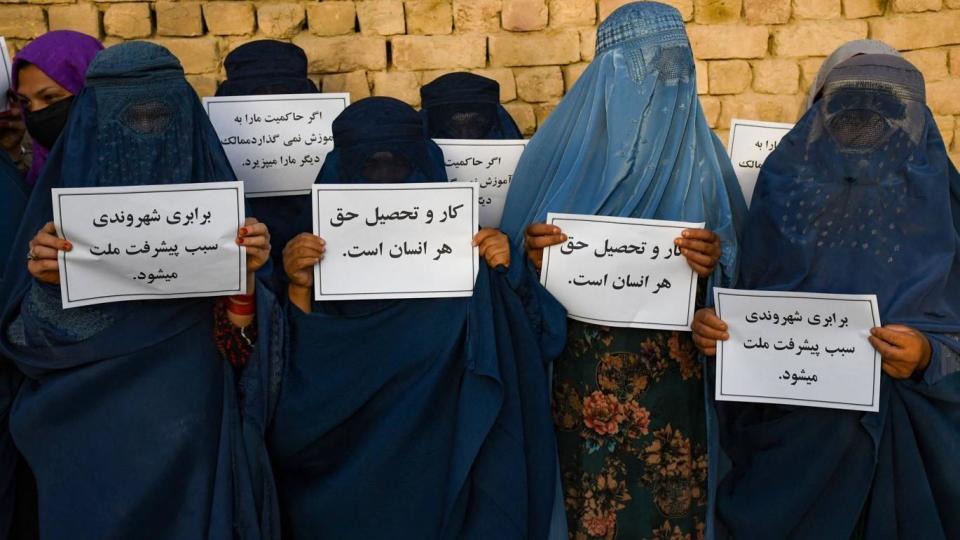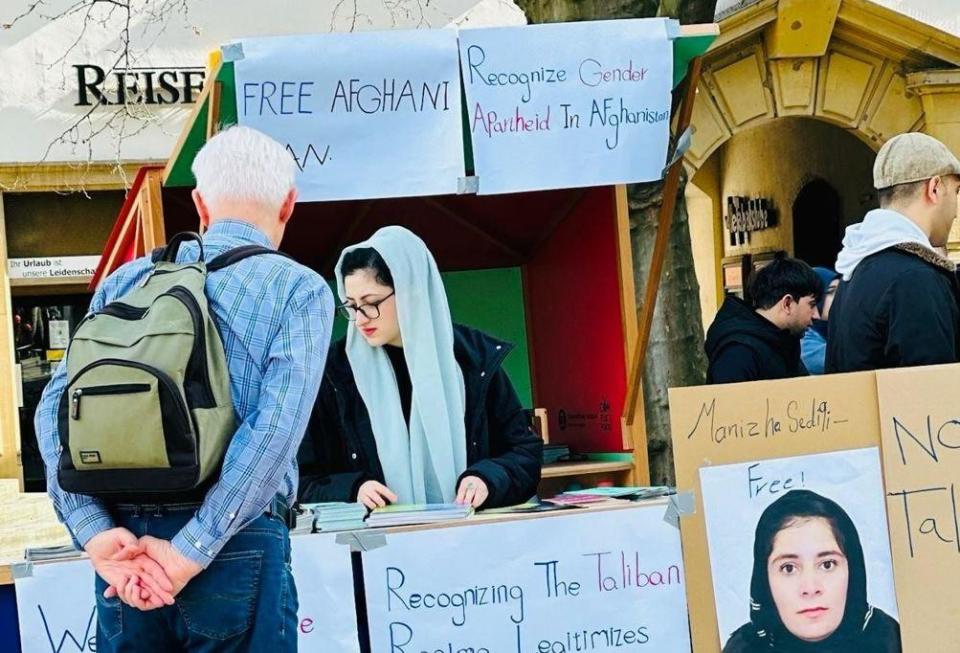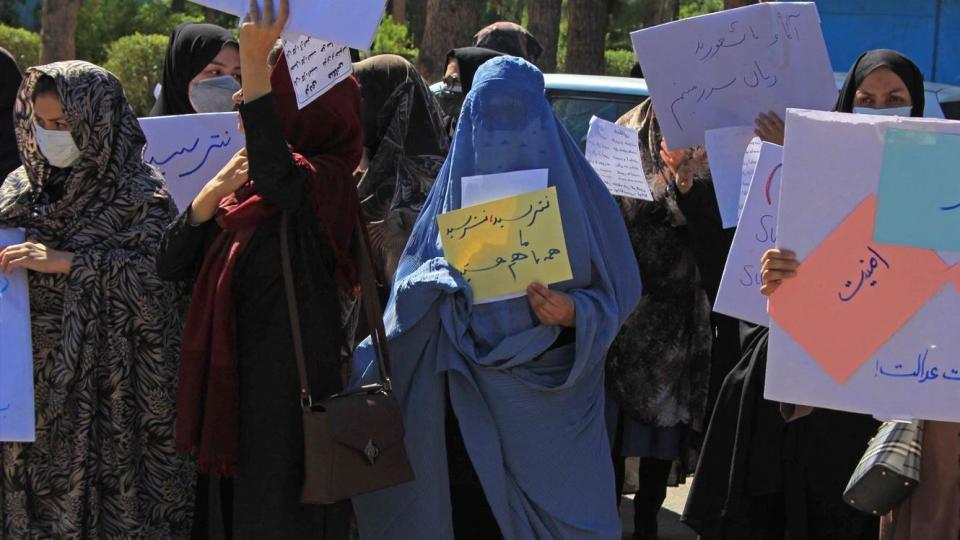What happened to the women who took on the Taliban?

After the Taliban restricted Afghan women's ability to work, learn and go out in public, some women initially defied these new rules, taking to the streets to protest.
But soon, those who gathered in the capital Kabul and other major cities to demand "food, work, freedom" felt the full force of the Taliban.
Protesters tell the BBC they were beaten, abused, jailed and even threatened with death by stoning.
We speak to three women who challenged the Taliban government after it began to place restrictions on women's freedom following the Taliban's takeover on 15 August 2021.
Marching through Kabul

When Taliban militants took over Kabul on 15 August 2021, Zakia's life began to crumble.
She had been the breadwinner for her family before the Taliban returned to power - but quickly lost her job following the takeover.
When Zakia (who is using a pseudonym) joined a protest more than a year later in December 2022, it was her first chance to express her anger at losing the right to work and to education.
Protesters were marching to Kabul University, chosen for its "symbolic importance", but were stopped before they could reach their destination.
Zakia was loudly shouting slogans when Taliban armed police put an end to her short-lived rebellion.
"One of them pointed his gun right into my mouth and threatened to kill me right there if I didn't shut up," she recalls.
Zakia saw fellow protesters bundled into a vehicle.
"I resisted. They were twisting my arms," she says. "I was being pulled by the Taliban who were trying to load me into their vehicle and other fellow protesters who were trying to release me."
In the end, Zakia managed to escape - but what she saw that day left her terrified for the future.
"Violence was not taking place behind closed doors any more," she says, "it was taking place on the streets of capital Kabul in full public view."
Arrested and punched
Mariam (not her real name) and 23-year-old student Parwana Ibrahimkhail Nijrabi were among the many Afghan protesters who were detained after the Taliban takeover.
As a widow and sole breadwinner for her children, Mariam was terrified she wouldn't be able to provide for her family when the Taliban introduced rules restricting women's ability to work.
She attended a protest in December 2022. After she saw fellow protesters being arrested, she tried to flee but didn't get away in time.

"I was forcefully pulled out of the taxi, they searched my bag and found my phone," she recalls.
When she refused to give Taliban officials her pass code, she says one of them punched her so hard she thought her ear drum had burst.
They then went through the videos and photos in her phone.
"They got furious and grabbed me by pulling my hair," she says. "They caught my hands and legs and threw me into the back of their Ranger."
"They were very violent and repeatedly called me a whore," Mariam continues. "They handcuffed me and put a black bag over my head, I could not breathe."
A month later, Parwana too decided to protest against the Taliban, along with a group of fellow students, organising several marches.
But their action was also met with swift reprisal.
"They started torturing me from the moment they arrested me", says Parwana.
She was made to sit between two male armed guards.
"When I refused to sit there, they moved me to the front, put a blanket over my head and pointed the gun and told me not to move."
Parwana started feeling "weak and like a walking dead" among so many heavily armed men.
"My face was numb as they slapped me so many times. I was so scared, my entire body was trembling."
Life in jail
Mariam, Parwana and Zakia were fully aware of the potential consequences of public protest.
Parwana says she never expected the Taliban to "treat her like a human being". But she says she was still stunned by her degrading treatment.
Her first meal in jail left her in shock.
"I felt a sharp thing scratching the roof of my mouth," she says. "When I looked at it, it was a nail - I threw up."
In subsequent meals, she found hair and stones.
Parwana says she was told she would be stoned to death, leaving her crying herself to sleep at night and having dreams about being stoned while wearing a helmet.
The 23-year-old was accused of promoting immorality, prostitution and spreading western culture and was in jail for about a month.
Mariam was kept in a security unit for several days, where she was interrogated with a black bag covering her head.
"I could hear several people, one would kick me and ask who paid me to organise [the] protest," she recalls. "The other would punch me and say 'Who do you work for?'"
Mariam says she told her interrogators she was a widow who needed work to feed her children - but says her answers were met with more violence.

Confession and release
Parwana and Mariam were both separately released following intervention by human rights organisations and local elders, and they are now no longer living in Afghanistan.
Both say they were forced to sign confessions admitting their guilt and promising not to take part in any protests against the Taliban.
Their male relatives also signed official papers pledging that the women would not take part in any more protests.
We put these allegations to Zabihullah Mujahid, senior spokesman of the Taliban government, who confirmed women protesters were arrested but denied they were badly treated.
"Some of the women who were arrested were involved in activities that were against the government and against public safety," he said.
He disputes the women's account and denies torture was used: "There is no beating in any of the Islamic Emirate's prisons and their food is also approved by our medical teams."
Lack of basic facilities
Human Rights Watch's own interviews with some protesters following their release corroborated the accounts heard by the BBC.
"The Taliban use all kinds of tortures and they even make their families pay for these protests, sometimes they imprison them with their children in terrible conditions," said Ferishtah Abbasi of HRW.
Amnesty International researcher Zaman Soltani, who spoke to several protesters after they were released, said prisons lacked basic facilities.
"There is no heating system in winter, prisoners are not given good or enough food and health and safety issues are not taken into consideration at all," Soltani said.
Longing for a normal life

Around the time of their takeover, the Taliban said women could continue to work and go to school, with the caveat that this could only happen in line with Afghan culture and Sharia law.
They continue to insist the ban on girls' schooling beyond year six is temporary but have given no firm commitment to reopening girls' secondary schools.
Back in Afghanistan, Zakia took one more chance and launched a home tuition centre to educate young girls. This also failed.
"They feel threatened by a group of young women getting together in a place on regular basis," she says, her voice filled with sadness. "The Taliban managed to do what they wanted. I am a prisoner in my own house."
She still meets her fellow activists but they are not planning any protests. They publish occasional statements on social media using a pseudonym.
Asked about her dreams for Afghanistan, she breaks down in tears.
"I cannot do anything. We don't exist any more, women are removed from public life," she says. "All we wanted was our basic rights, was it too much to ask?"


